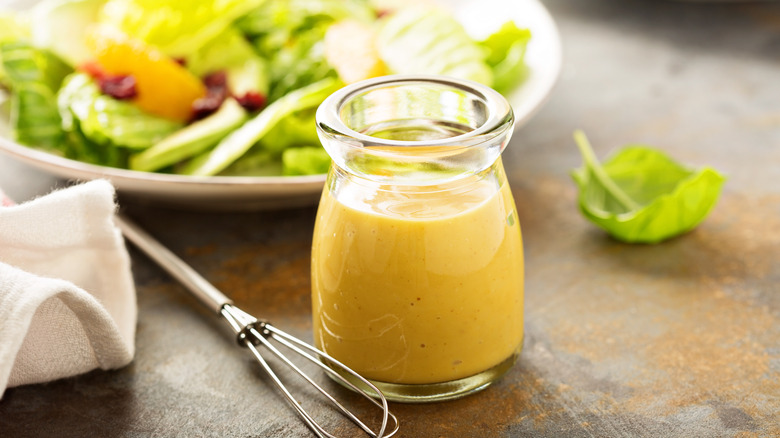How Egg Yolks Perfect Ina Garten's Vinaigrette
Whatever you decide to toss together – proteins, fruit, nuts, veggies, you name it – the dressing makes or breaks a salad. While it's easy to purchase a bottle, making your own gives you greater control over what goes in it and how you might choose to improve it. (Besides, registered dietitian Kathy McManus, director of the Department of Nutrition at Brigham and Women's Hospital, warns that store-bought dressings are often high in saturated fat, calories, sodium, and sugar.) One variety of dressing that can be elevated "Barefoot Contessa"-style is the vinegarette.
A vinaigrette combines oil and an acid, such as vinegar, and is seasoned with salt, pepper, garlic, and herbs, per Chefs Notes. Vinaigrettes are versatile, using different types of vinegar and flavored oils, but generally, it is one part acid to three or four parts oil, depending on preferences. To make this condiment creamy, an emulsifier like dijon mustard is whisked in. With so many variations and just a handful of pantry ingredients, preparing this salad dressing at home can be simple and delicious. Those who want to take a page from Ina Garten should have some eggs on hand because she uses yolks in her vinaigrette.
Rich, creamy vinaigrettes
When asked on "PBS News Hour" to name one recipe everyone should know how to make, the "Barefoot Contessa," Ina Garten said vinaigrette. Noting that making it is faster than driving yourself to the supermarket, Garten said her recipe for mustard vinaigrette is quick and so much tastier than anything in a bottle. While she incorporates the usual suspects, her secret to an extra creamy vinaigrette is the addition of a raw egg yolk. The egg yolk is an additional emulsifier that makes a rich, creamier dressing. She compared it to making thin mayonnaise, a condiment that can be used in a recipe for creamy homemade ranch dressing.
Garten relies on organic raw eggs. The USDA advises when using uncooked eggs in food, they should have been pasteurized to kill harmful bacteria like Salmonella, which can lead to food poisoning. The elderly, pregnant women, anyone with a compromised immune system, and young children should avoid consuming them raw. If you are uncomfortable with the risk, Garten says, leave out the egg yolk. Although the dressing won't be as rich, it will still have a delicious flavor.

